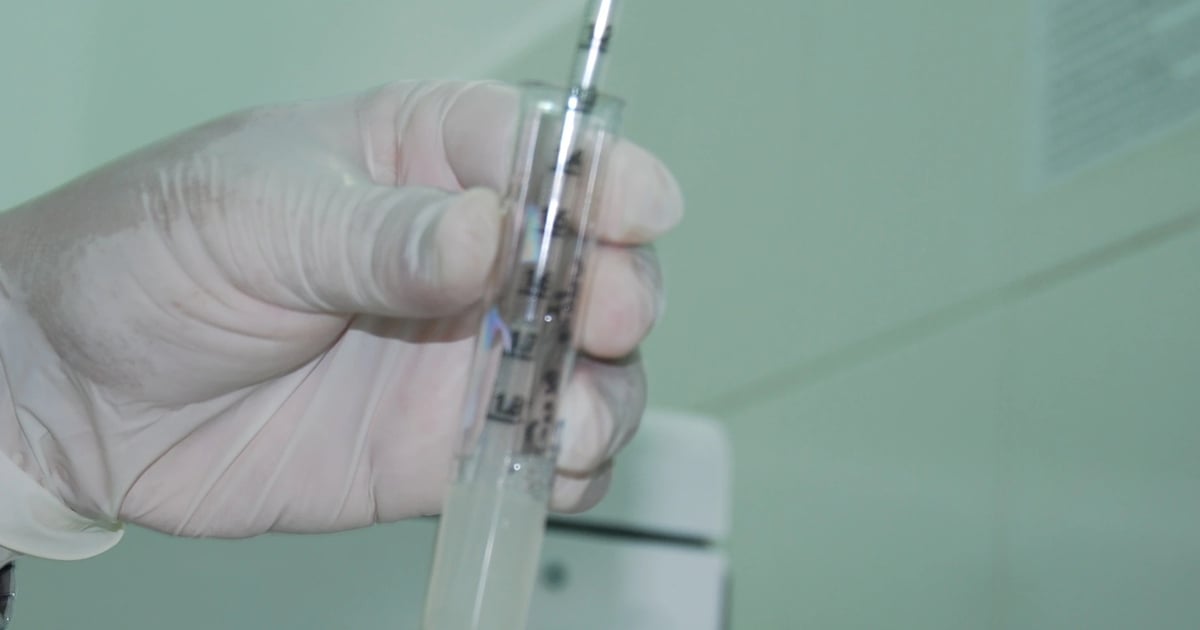Hanoi: A 26-year-old girl, married for a year without children, went to the doctor and found out she was infertile due to ovulation disorders and irregular menstruation.
The patient said that her irregular menstrual cycle had lasted for two years, with her period occurring only once every two to three months, but there was no pain or other unusual symptoms, so she did not go to the doctor. After a year of marriage, the couple went to the doctor because they were having trouble conceiving. Test results showed that she was infertile due to ovulation disorders.
On October 16, Dr. Phan Chi Thanh, Department of Examination, Central Obstetrics Hospital, said that people with ovulation disorders are prone to infertility. In this case, doctors need to check further, especially ovarian function and other indicators for treatment. If medication is not effective, doctors will prescribe artificial insemination to have children.
According to doctors, the causes of infertility in women often focus on three main groups, including problems in the uterus, where the fetus nests and develops. Damage to the fallopian tubes such as inflammation and blockage also prevents sperm from meeting the egg for successful conception. The ovaries, which contain the "golden egg" to fertilize with sperm to form an embryo, have problems when functioning. In addition, the menstrual cycle is a "mirror" reflecting a woman's reproductive health and future fertility.
Normal people will have one menstrual cycle each month, meaning one egg will mature and then be released. Thus, there are 12 months in a year, women with good reproductive health and regular menstruation will have 10-12 eggs.
On the contrary, women with ovulation disorders, having their period once every two to three months, or even having their period once every six months or not having their period at all, will have a decreasing number of mature eggs released. In many cases, only one or two mature eggs are released in a year. At this time, the chance of pregnancy in patients with ovulation disorders is low.
"If you have natural sex, it will take many years to have a chance to conceive because the number of mature eggs is too small," the doctor said.
In addition, egg quality plays an important role in helping women get pregnant. In patients with polycystic ovaries or ovulation disorders, the rate of abnormal ova and eggs is higher than in normal women. When using in vitro fertilization, the rate of abnormal embryos is also higher.
Menstrual disorders are abnormal manifestations of the menstrual cycle, the number of days of menstruation and the amount of menstrual blood compared to previous normal cycles. This can be a symptom of a disease, which can be due to hormones, physical damage to the female reproductive organs, or changes in living conditions and environment. This condition can still cause infertility if women suffer from some gynecological diseases and do not treat them promptly. Cases of menstrual disorders that cause infertility include polycystic ovary syndrome, endometriosis, premature ovarian failure, uterine fibroids, etc.
Therefore, women should pay attention to some abnormalities such as menstrual cycles longer than 35 days (oligomenorrhea) or shorter than 22 days (polymenorrhea), or even no menstruation for 6 months or more (amenorrhea).
Abnormalities in the number and days of menstruation such as hypermenorrhea with menstrual blood volume over 20 ml, hypomenorrhea with menstrual blood volume less than two days and menstrual blood volume less than 20 ml per cycle or menorrhagia with menstrual blood volume over 7 days.
Menstrual blood is usually dark red, has a slightly fishy smell, and does not clot. If menstrual blood contains blood clots or is bright red or light pink, it is abnormal.
Doctors recommend that women should improve their diet, sleep, and work properly. Actively exercise regularly. Keep a comfortable mentality, try to work and live in a clean, fresh, and least stressful environment possible. Limit the use of stimulants such as alcohol, beer, and cigarettes.
Women should proactively have regular gynecological check-ups at reputable medical facilities to detect early abnormalities in the reproductive organs, hormonal disorders or menstruation.
Thuy An
Source link



![[Photo] Unique folk games at Chuong Village Festival](https://vstatic.vietnam.vn/vietnam/resource/IMAGE/2025/4/10/cff805a06fdd443b9474c017f98075a4)


![[Photo] Opening of the 11th Conference of the 13th Party Central Committee](https://vstatic.vietnam.vn/vietnam/resource/IMAGE/2025/4/10/f9e717b67de343d7b687cb419c0829a2)
![[Photo] April Festival in Can Tho City](https://vstatic.vietnam.vn/vietnam/resource/IMAGE/2025/4/10/bf5ae82870e648fabfbcc93a25b481ea)








































































![[Infographic] Diverse activities of the 4th Dong Thap Province Book and Reading Culture Day in 2025](https://vstatic.vietnam.vn/vietnam/resource/IMAGE/2025/4/10/a5f00b7d966a475d891f3c3e528c9a66)
















Comment (0)